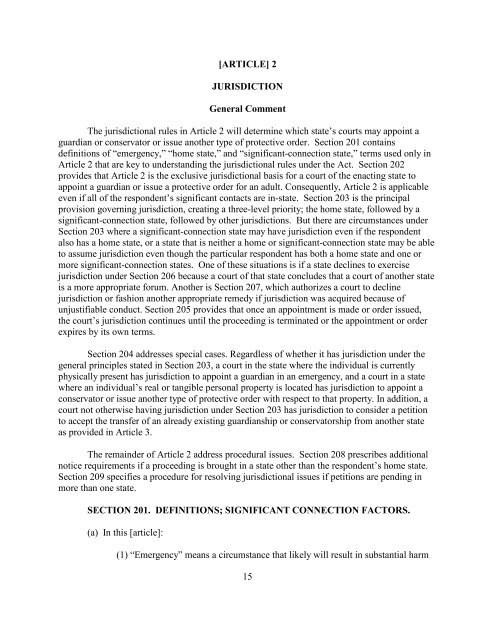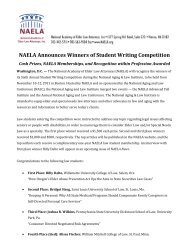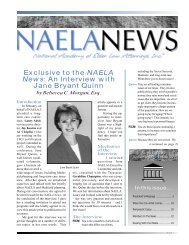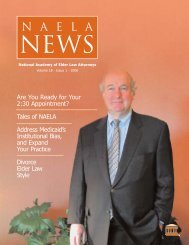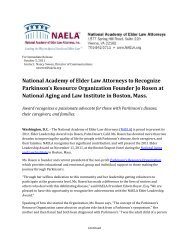uniform adult guardianship and protective proceedings jurisdiction act
uniform adult guardianship and protective proceedings jurisdiction act
uniform adult guardianship and protective proceedings jurisdiction act
You also want an ePaper? Increase the reach of your titles
YUMPU automatically turns print PDFs into web optimized ePapers that Google loves.
[ARTICLE] 2JURISDICTIONGeneral CommentThe <strong>jurisdiction</strong>al rules in Article 2 will determine which state’s courts may appoint aguardian or conservator or issue another type of <strong>protective</strong> order. Section 201 containsdefinitions of “emergency,” “home state,” <strong>and</strong> “significant-connection state,” terms used only inArticle 2 that are key to underst<strong>and</strong>ing the <strong>jurisdiction</strong>al rules under the Act. Section 202provides that Article 2 is the exclusive <strong>jurisdiction</strong>al basis for a court of the en<strong>act</strong>ing state toappoint a guardian or issue a <strong>protective</strong> order for an <strong>adult</strong>. Consequently, Article 2 is applicableeven if all of the respondent’s significant cont<strong>act</strong>s are in-state. Section 203 is the principalprovision governing <strong>jurisdiction</strong>, creating a three-level priority; the home state, followed by asignificant-connection state, followed by other <strong>jurisdiction</strong>s. But there are circumstances underSection 203 where a significant-connection state may have <strong>jurisdiction</strong> even if the respondentalso has a home state, or a state that is neither a home or significant-connection state may be ableto assume <strong>jurisdiction</strong> even though the particular respondent has both a home state <strong>and</strong> one ormore significant-connection states. One of these situations is if a state declines to exercise<strong>jurisdiction</strong> under Section 206 because a court of that state concludes that a court of another stateis a more appropriate forum. Another is Section 207, which authorizes a court to decline<strong>jurisdiction</strong> or fashion another appropriate remedy if <strong>jurisdiction</strong> was acquired because ofunjustifiable conduct. Section 205 provides that once an appointment is made or order issued,the court’s <strong>jurisdiction</strong> continues until the proceeding is terminated or the appointment or orderexpires by its own terms.Section 204 addresses special cases. Regardless of whether it has <strong>jurisdiction</strong> under thegeneral principles stated in Section 203, a court in the state where the individual is currentlyphysically present has <strong>jurisdiction</strong> to appoint a guardian in an emergency, <strong>and</strong> a court in a statewhere an individual’s real or tangible personal property is located has <strong>jurisdiction</strong> to appoint aconservator or issue another type of <strong>protective</strong> order with respect to that property. In addition, acourt not otherwise having <strong>jurisdiction</strong> under Section 203 has <strong>jurisdiction</strong> to consider a petitionto accept the transfer of an already existing <strong>guardianship</strong> or conservatorship from another stateas provided in Article 3.The remainder of Article 2 address procedural issues. Section 208 prescribes additionalnotice requirements if a proceeding is brought in a state other than the respondent’s home state.Section 209 specifies a procedure for resolving <strong>jurisdiction</strong>al issues if petitions are pending inmore than one state.SECTION 201. DEFINITIONS; SIGNIFICANT CONNECTION FACTORS.(a) In this [article]:(1) “Emergency” means a circumstance that likely will result in substantial harm15


